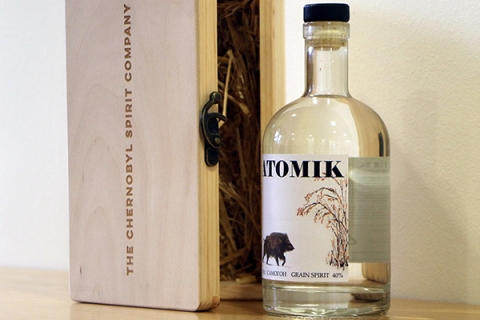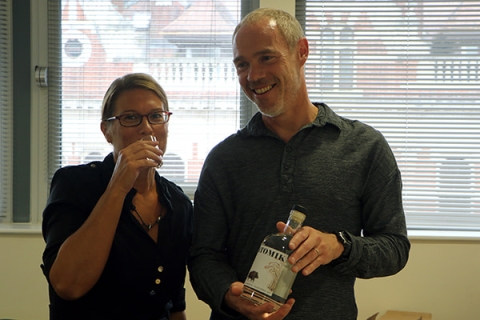
The University’s Executive Board (UEB) have tasted the first radioactive-free vodka to be produced in the Chernobyl abandoned zone, as part of their support for Professor Jim Smith’s research into safe crop production.
Earlier this year Professor Smith and colleagues in the UK and Ukraine presented the results of a three-year research project into the transfer of radioactivity to crops in Chernobyl.
Grain for the vodka is grown near Chernobyl, then used to produce alcohol. The distillation process leaves impurities in the waste. As a result the final product, ATOMIK vodka has no detectable radioactivity from Chernobyl, only the same natural radioactivity level found in any other spirit drink.
Professor Smith, from the School of the Environment, Geography and Geosciences, now hopes to produce the artisan vodka via a social enterprise, The Chernobyl Spirit Company. 75 per cent of the profits will be given back to the affected community for economic development and wildlife conservation.
This week UEB had the chance to hear about the team’s research, and sample the spirit.

Professor Sherria Hoskins and Professor Jim Smith with a bottle of ATOMIK vodka
Professor Sherria Hoskins, Executive Dean for the Faculty of Science and Health, said “This fantastic piece of research has the potential to transform the lives of those affected by the accident at Chernobyl thirty three years ago.
“Being able to confirm that parts of the region are now safe for growing certain crops and food could open the door to economic recovery for the communities living in and around the area - as well as show people the power of science in action.”
Next steps for ATOMIK vodka
Global interest in the economic revival of the area around Chernobyl is at a high after the research hit the news around the world - including coverage on BBC News at 10, Sky News, The Times, The Guardian, New York Times and CNN.
An audience over 10 million people read or heard about the research, and offers of support and partnership work have flooded in.
The project team hopes to start with small scale distillation. All being well, within the next 3 years, the company could be producing as many as 10,000 bottles a year - contributing significantly to the economic recovery of the region.
